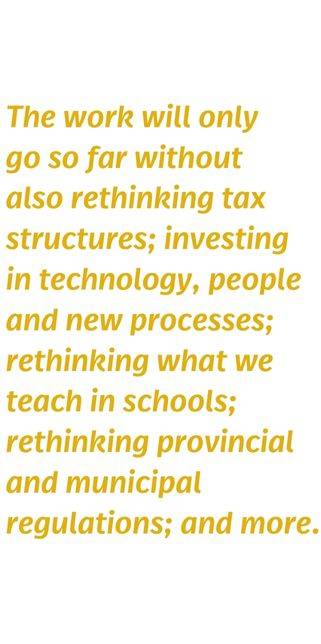A few months ago, the finance leader of one of our clients in a small B.C. community casually dropped into a conversation that they had just crossed the $1-million mark in annual payroll.

I stopped the conversation. “Have you taken a moment to celebrate that?” I asked. “Do you realize how incredible that is in the impact you are having on your community? One million dollars a year is flowing from you through the bank accounts of your employees and into the restaurants, grocery stores, hockey teams, dance classes and schools of your community. You have to celebrate this!”
Little else we could have discussed in that moment could matter more than celebrating that accomplishment.
That moment was integrative capitalism in action: wealth and well-being flowing between the business and the community that in turn supports them. Integrative capitalism sees businesses as the most effective mechanism we have in our society for creating and distributing value and wealth. I borrowed the word “integrative” from the world of negotiation. Negotiation theory distinguishes between distributive (win-lose/cut-up-the-fixed-pie) and integrative (win-win/grow-the-pie-together) approaches to a negotiation. In integrative negotiation we seek to understand and integrate interests, with the goal of creating value for all parties.
The Status Quo Is Not Working
The model of capitalism in place since the 1980s assumes that maximizing wealth (profits) solely for shareholders magically benefits communities in what is often called “trickle-down economics.” This has not worked. In Canada, wages have stagnated since 1975, communities are struggling and productivity has flatlined.
A New Paradigm
Businesses — in partnerships with communities and government — can change that story. Businesses can choose to integrate employees and communities — our businesses rely on the well-being of both — in a virtuous loop: healthy communities supporting healthy businesses supporting healthy communities. Businesses sit at the centre of this. Here are some concrete steps that move us in the right direction:
Income: a living wage.
If every business paid a living wage the impact would be substantial. If we “can’t afford it” then we need to step back and understand the situation holistically. Inputs such as pricing, efficiency and regulatory frameworks (national to regional) need to be reconsidered.
Wealth and ownership.
Initiatives such as employee stock options (ESOPs) and employee ownership trusts (EOTs) are finally starting to take hold in Canada and create significant opportunities for sustainable wealth in our communities. Profit sharing and ownership align risk, effort and reward. They are a powerful way to align business, individuals and communities in a virtuous cycle.
Education.
- A living wage would put the post-secondary education in trade schools and universities within reach of more community members.
- Industry school partnerships would improve the flow of talent to nurture the virtuous loop of integrative capitalism.
- Increasing investment in internal upskilling and cross-training increases productivity and feeds that virtuous loop.
Good jobs strategy.
The book The Good Jobs Strategy, by MIT’s Zeynep Ton, reframes labour as capital (an investment) not a resource (cost). Fair compensation, stable schedules, training and development and career pathways are all part of this strategy. These pillars support healthy employees, vital communities and profitable businesses.
Account for negative externalities.
The cost of certain business practices to communities and our planet should be recognized and paid for. Paying “true” costs of pollution, infrastructure degradation, energy and water, extractive leveraged buyouts, etc., would create a business incentive to — at a minimum — not behave in exploitive ways.
Examples:
- When large retail chains pay less than a living wage, forcing employees to turn to government assistance to make ends meet, that cost should be recognized.
- When a business pollutes the environment and degrades the quality of life for a community, that cost should be recognized.
Are these things already happening? Yes, in businesses and communities all across this country. Look at organizations such as CHEK News, Accent Inns and Hotel Zed, Kinetic Construction, VMAC (Nanaimo), and further abroad at Costco, SRC Holdings Corp. (Jack Stack), Patagonia, Semco Energy, Trader Joe’s and many others. All are — in their own way — moving towards a new relationship between value, wealth, employees and community.
The idea of integrative capitalism and the virtuous cycle that feeds it is simple; the execution is not. The work will only go so far without also rethinking tax structures; investing in technology, people and new processes; rethinking what we teach in schools; rethinking provincial and municipal regulations; and more.
The journey toward integrative capitalism is not a quick fix. It requires an updated understanding of the interconnectedness of business, people, community and the planet, and a move from magical “trickle down” to intentional circular value creation. If we can do that work, businesses would play an even more impactful role in building more equitable, sustainable and prosperous communities.
Clemens Rettich is an organizational consultant with Beaton Rettich Waters. Once and always a musician and an educator, he has spent over 30 years practising the art of management. Rettich also shares his passion for leadership and organizational behaviour with his students at the Peter. B. Gustavson School of Business at the University of Victoria.
Photo: Getty Images
























